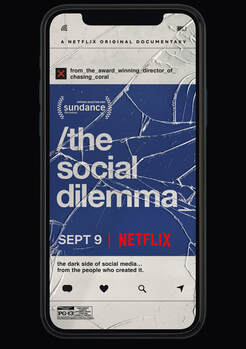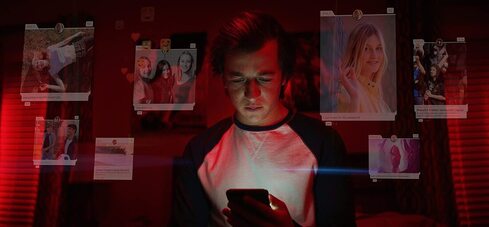
is also advised – this documentary film is rated ‘12’.
Once in a while, the streaming behemoth Netflix, releases a documentary which truly captures the minds of our binge-watching culture. Most recently, viewers were treated to the shocking, sensationalist exploits of Joe Exotic on Tiger King – a much needed reprieve from the mounting fears brought on by COVID-19, way back in March. And yet, at a time in which we’re in greater need of the levity that would come from a Tiger King sequel series, along comes The Social Dilemma… This revelatory, documentary-drama hybrid is a serious ‘entertainment’ for a serious time - relatively devoid of humour and committed to blowing the whistle on the corporations we engage with on a daily basis. In essence, this is a public service announcement which seeks to bring to light the dangerous impact that social networking has upon humans, presented by tech experts who are now disowning their own, multi-million-dollar creations, which have since taken on a life of their own…
At some point, director/co-writer Jeff Orlowski must have imagined that he was at risk of sounding like a group of doomsday prophets, alerting us to the arrival of the non-fiction ‘Skynet’ of The Terminator film franchise. And in a way, you’d be forgiven for thinking that. But Orlowski smartly chooses to frame his docu-drama around the conducting of interviews with those responsible, in one way or another, for manufacturing the software of various social medias, thereby establishing the overlords of Silicon Valley. Tristan Harris, a former design ethicist at Google, leads the charge in these interviews, revealing that the algorithmic technologies which underpin the functionality of these social medias, are far more significant than we ever imagined. For not only do the algorithms possess the ability to adapt themselves based on our behaviours, but they have the power to alter our behaviours too, causing us to become enslaved by flooding our feeds with content that the algorithms know will interest us, as a result of having unlimited access to our personal data.
When signing up to these social media platforms which seem so innocent on the surface, rarely do we consider the possibilities that such technologies are manipulative, have the power to influence our thinking (politically and otherwise), or potentially take control of us to lead people into sin. But the Bible specifically warns against such carelessness, especially when the writer of 1 Peter encourages their readers in this way: “Be alert, be on watch! Your enemy, the Devil, roams around like a roaring lion, looking for someone to devour” (1 Peter 5:8-9, GNT). The Bible knows that the Devil will do anything within his power to entice us into making poor decisions, in order that he might entrap us within sinful patterns, thereby preventing us from connecting with God. So often, people (I included) will choose to ‘sign up’ to something which looks good on the surface, without actually digging deeper to determine whether they’re making the right decision or not. And that, the Bible teaches, is where we have all gone wrong - “everyone has sinned” (Romans 3:23, NLT) against God, and have therefore “fall(en) short of God’s glorious standard” (Romans 3:23, NLT) for the way He desires us to live our lives. So not only does the darkness which comes with sin, enter into a person’s life, but it also begins to control and blind them, prompting the Devil to specifically disrupt their lives:
(2 Corinthians 4:4, GNT)
So just as in the drug and social media industry, who are two of the few industries to call their customers “Users”, we too have become users who are addicted to sin. But the Bible teaches that even though we have permitted our lives to be dictated by sin, “God has shown us how much he loves us” by sending Christ to die for us, taking the punishment that we deserved, even “while we were still sinners” (Romans 5:8, GNT), to make a way for us to ask for forgiveness from God and be saved from our eternal punishment. But this was only achieved through Christ alone, God’s one and only Son, who was given over to be crucified on the cross, as the “…offering for our sin”, so “that we could be made right with God through Christ” (2 Corinthians 5:21, NLT). Thus, the Bible makes it abundantly clear that God doesn’t want us to be enslaved to sin, but free to live in relationship with Him – both now and in eternity in Heaven with Him. It was “for freedom that Christ has set us free” (Galatians 5:1, NIV) – that we might be connected with God, the source of all life, not that we might be controlled. We might be users online, but do we want sin to use us?
Challenge:
Why not prayerfully invite a friend or family member who doesn’t yet know Jesus, to watch The Social Dilemma for themselves? Use the film’s themes to ask them what they thought of the film, if they spotted any links to Christianity and what they might think of the Gospel’s response to this subject.
If you feel able to, ask them what they think about the manipulative nature of these social medias. Do they ever feel manipulated whilst using them? Ask them what they think about the Devil’s aim to manipulate us without realising it, do they believe that God seeks to free us when we fall into temptations from the Devil? Later, if they're open to hearing it, take an opportunity to share the hope of the Gospel message with them - perhaps focus on how the Bible teaches that "If anyone belongs to Christ, then he is made new. The old things have gone; everything is made new!" (2 Corinthians 5:17, ICB).
Prior to watching the film for yourself, however, take a moment to pray that God would speak to you through the film. If you feel comfortable, pray this prayer over all of your future, film-watching experiences:
Dear Lord, As I watch this film, I ask that you would be present here with me. Highlight to me anything within it that is honourable, anything that can be used in conversation for your Kingdom purposes. Amen.
The Social Dilemma is available to stream exclusively on Netflix.



 RSS Feed
RSS Feed